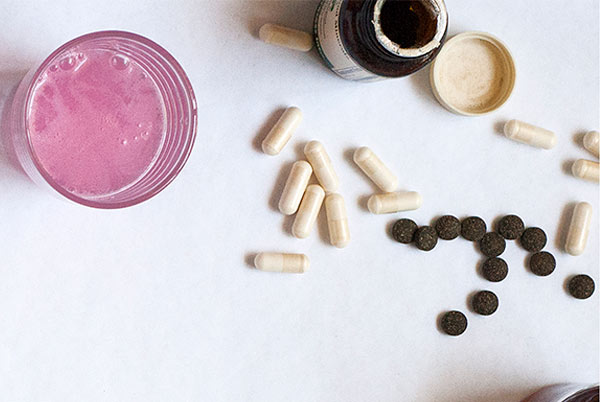
Supplements: Helping Or Hindering?
Why Liquid Supplements Might Work for You
If you are thorough in following a proper gluten-free diet and you take supplements but you still feel like something is off, it could be that your body is not getting what it needs from your supplements. According to the Celiac Disease Foundation, those with celiac disease are often plagued by nutrient mal-absorption due to degradation of the villi in the lining of the small intestine. Those with gluten sensitivity do not necessarily have the same damage to the intestine as those with celiac disease, so mal-absorption might not be as much of an issue. However, this varies from person to person depending on the symptoms, always check with a doctor. Capsules and tablets can sometimes be difficult for your body to break down, meaning you might not get the proper nutrients from them. Added to that is the fact that some supplements contain gluten as a filler. Our own editor-in-chief experienced this first hand. She followed a strict gluten-free diet, worked out regularly and took vitamins, yet she still felt ill. As it turned out, her vitamin E contained gluten and she was inadvertently ingesting small amounts of the one thing she had tried diligently to avoid.
So what should you do to ensure you are getting everything you need from your supplements? First, if you suspect your vitamins contain gluten, research them fully to get to the bottom of it. If they contain gluten, seek out a new supplement that is certified gluten-free and ditch the old supplements. Next, talk to a medical professional to determine whether or not you are suffering from mal-absorption.
According to The Merck Manual Home Health Handbook, nutrient mal-absorption is often characterized by chronic diarrhea, weight loss, weakness, and in many cases, anemia. If you suspect you aren’t properly absorbing nutrients from the vitamins you take, you may want to consider the following alternative.
I spoke to Leslie Ellis, Marketing Manager for Wellesse, a company that specializes in gluten-free liquid supplements.
Wellesse (pronounced like wellness, minus the “n”), a Nature’s Way brand, is located in Ferndale, Washington, and has been around for more than 25 years. They have since become the leading producer of liquid calcium and liquid glucosamine supplements, according to a 2013 report from Information Resources, Inc. Ellis gave me some insight into the benefits of liquid supplements.
“A lot of people have trouble swallowing pills and tablets, so the liquids are much easier for them to take,” Ellis said. “And sometimes you have to take a lot of tablets, several times a day, but our supplements are usually just one dose, once a day, one ounce or less – so it’s quick and easy.”
Quick and easy are just a few of the benefits of liquid supplements. According to Ellis, another reason people might prefer liquid supplements over tablets is because tablets must often be taken with food, but this is not the case with Wellesse liquid supplements. You can take them with or without food or even mixed into water, juice, or smoothies. Consumers have become increasingly aware of the benefits of liquid supplements .According to recent market research data from SPINS, there has been a 7.5% increase in sales for liquid supplements, in contrast with a 0.3% decline in tablets. This data came from a report during the 52 week period ending April 2013. To further my knowledge of the benefits of liquid supplements, I spoke to registered dietitian Marie Spano, MS, CSCS, CSSD, spokesperson for Wellesse. “The main reasons are fast absorbing and convenient,” Spano said of why people prefer liquid supplements. “It’s one less hard tablet that a person has to swallow and it quickly absorbs.”
Wellesse understands that better absorption is a necessity for those suffering from mal-absorption. Even after going on a gluten-free diet, your body can often take years to repair itself, and may make nutrient absorption difficult during that recovery time. Wellesse’s gluten-free liquid supplements solve this problem.
All of their products became GFCO (Gluten Free Certification Organization) certified last year. And to ensure quality, they are laboratory tested to verify proper dosages of each ingredient and are tested by a third party for purity and potency. Wellesse not only makes an effort to keep consumers safe with their gluten-free products, but they also keep consumers informed with a dedicated page on their website to inform visitors of the common nutrient deficiencies found in those with celiac disease.
According to their site, the most common is iron deficiency anemia. In fact, anemia is so common in those with celiac disease that the American Gastroenterological Association recommends being tested for celiac disease if you have unexplained anemia. If you have an iron deficiency, the signs are weakness, fatigue and pale skin. Impaired calcium absorption is also common among those with celiac disease.
According to The Merck Manual Home Health Handbook, calcium deficiencies can sometimes be characterized by bone pain and deformities, muscle spasms, tooth discoloration and greater susceptibility to bone fractures. But sometimes the signs of a calcium deficiency may not be as noticeable.
“For anemia typically you’re going to have signs and symptoms pretty soon, whereas with a constituent low calcium intake it may not present itself until you break a bone later on and find out that your bone density is low,” Spano said. Though these nutrient deficiencies may sound a bit scary, they are treatable. With a strict gluten-free diet, the right supplements, and an individualized treatment plan, you will be well on your way to combating mal-absorption. If you suspect you have a nutrient deficiency, it is always best to talk to your doctor about your particular symptoms before starting any new treatment plan.



